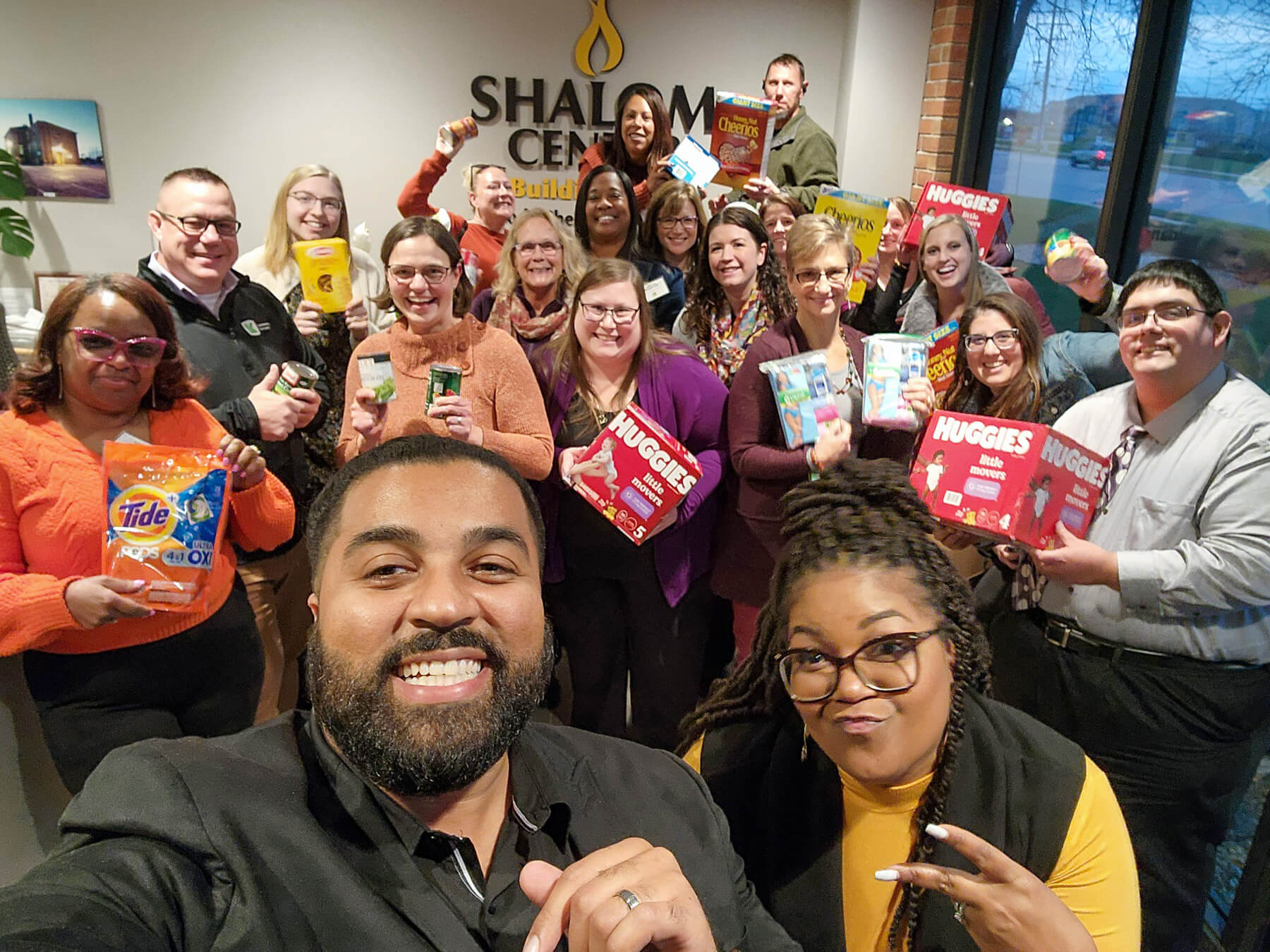

This month’s Leadership Kenosha session focused on “Social Service in Kenosha,” and we had the pleasure of spending the day at the Shalom Center. We had the opportunity to take a tour of the building, including the pantry, and enjoyed a delicious lunch in the Shalom Center Soup Kitchen.
We started the day with “Insights from Human Services Leaders in Kenosha” presented by Tamarra Coleman, Executive Director, Shalom Center, LK19 and Carolynn Friesch, CEO, United Way of Kenosha County, LK15. Carolynn shared and discussed the IMPACT 2-1-1 Statistical Report from 2021 for Kenosha County. 2-1-1 is the most comprehensive source of information about local resources and services in the country. 2-1-1 is available 24/7/365 and all calls are confidential and may be anonymous. To our group’s surprise, 58.8% of requests were for health, mental health and substance abuse information and only 5.1% of requests were for food resources. Carolynn shared that when you are assisting someone in any capacity it is important to ask the person what they need. To be successful we need to stop thinking we know what people need. Ask, “how can I help you?”
Tamarra spoke about housing in Kenosha, and shared that at this time we do not have enough affordable or accessible housing. According to the Wisconsin, Housing and Economic Development Authority, only a percentage of a landlord’s apartments must be affordable. For example, out of 64 units only 9 units have to be affordable. Low income guidelines are determined by the “market rate” and it can change from year to year. Year 1 – 2 bed, 1 bath apartment costs $850, but in Year 2 that same unit costs $1,100. Potential tennants are not asked what they need and are met with a “Program Rich, Barrier Strong” situation. In order to be approved to rent, in some cases tenants must have a minimum credit score of 640, no evictions, no felony convictions, 1st month’s rent, last month’s rent and a security deposit. Housing should only take up 30% of a person’s monthly income but studies have shown 46% is actually going to housing. There are many available jobs in Kenosha; however, a person cannot afford to live here with the wages offered.
What do you do when you do not have enough money to stay in your own place and you find yourself homeless? The Shalom Center works along with Women’s and Children’s Horizons (WCH), Kenosha Human Developmental Services (KHDS) and The Sharing Center to provide a coordinated entry process to anyone who enters any of the listed locations for assistance. Representatives from each location meet daily to review new cases, review client assessments and decide on the best course of action to assist each client. If a client doesn’t score high enough on their assessment to qualify for immediate shelter, they are provided with assistance to get to the next base place.
Next we learned about ALICE – Asset Limited, Income Constrained, Employed – households that are earning above the Federal Poverty Level (FPL) yet struggling to afford basic expenses. To put into perspective what members of our own community are facing we participated in a two poverty simulations. It was very eye opening to experience some of the challenges, tough choices and decisions people have to make on a daily basis to obtain or maintain basic needs.
In the afternoon, Amy presented Call to Action: Pathways for Public Service. The group participated in an activity where each person had to rank six activities in order most impactful to least impactful to the community. After each person completed their rankings, we reviewed each question and had to line up in the order we ranked that question, followed by discussion on our reasons why we chose that ranking. Then Debra gave a presentation on Non-Profit Board Service. She provided the definition of a non-profit organization, discussed the governing documents, non-profit corporate structure, legal duties of the board, liabilities, board roles and responsibilities, and who serves on non -profit boards. She provided the group with a list of questions that should be asked before deciding to join a non-profit board, and how to go joining a non-profit board. We were then divided into small groups and were given a board member scenario to review, and the group had to decide whether we would accept a sponsorship or not based on information provided in the scenario.
Then we met briefly with our project teams and provided updates to the group. We had a LEAD Presentation on Values-Driven Leadership. Leadership values shared with the group were passion, accountability, trust, humility, and integrity. Our group activity was a discussion on what leadership values do you see in your organization and why are they important. We concluded the day with Trisha Camosy LK19 who provided us with information about the plans for our graduation including the date and location. She will be contacting our two designated group members throughout the year to get feedback and suggestions on planning.
-Nicole Boyer
Posted on
December 6, 2022
